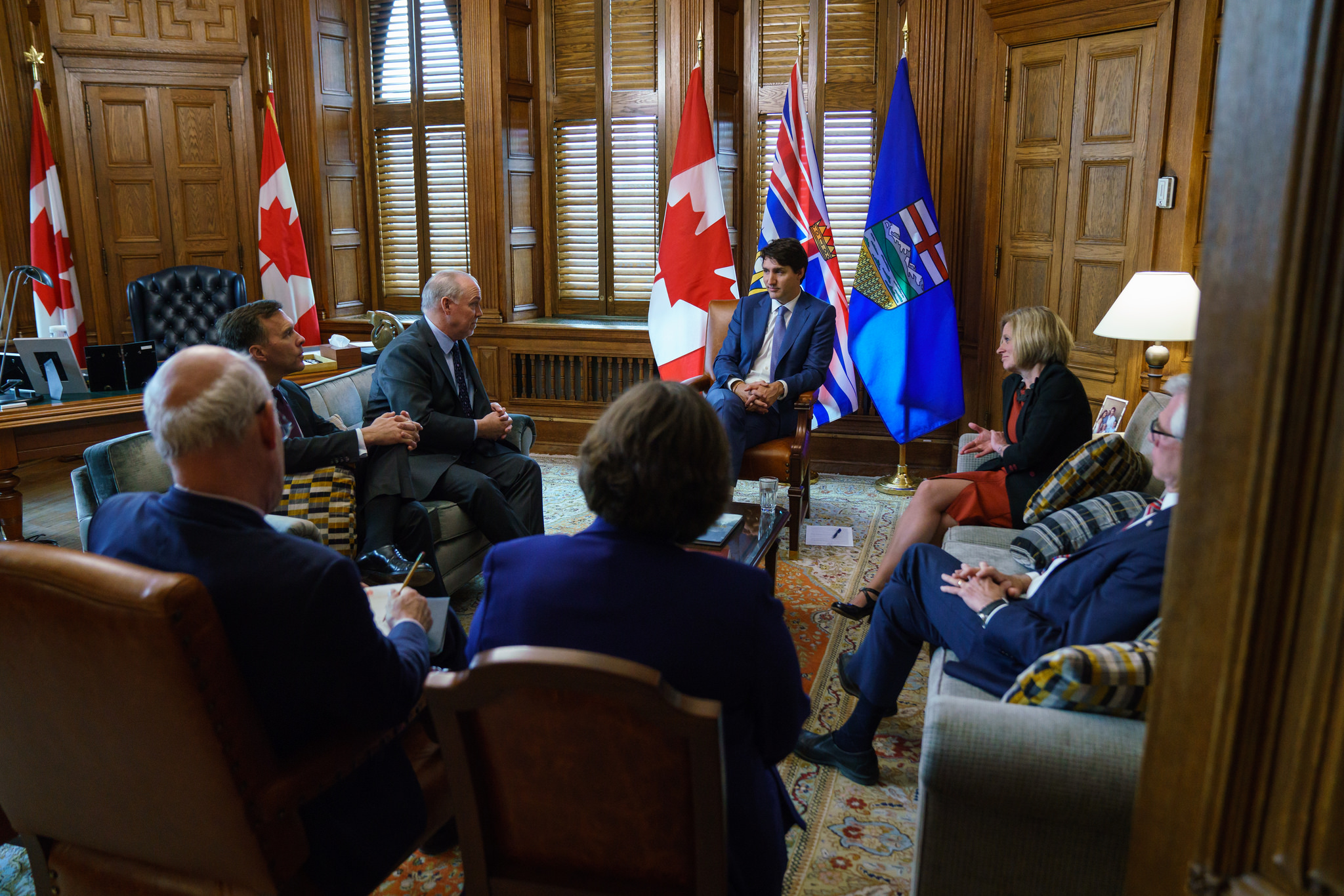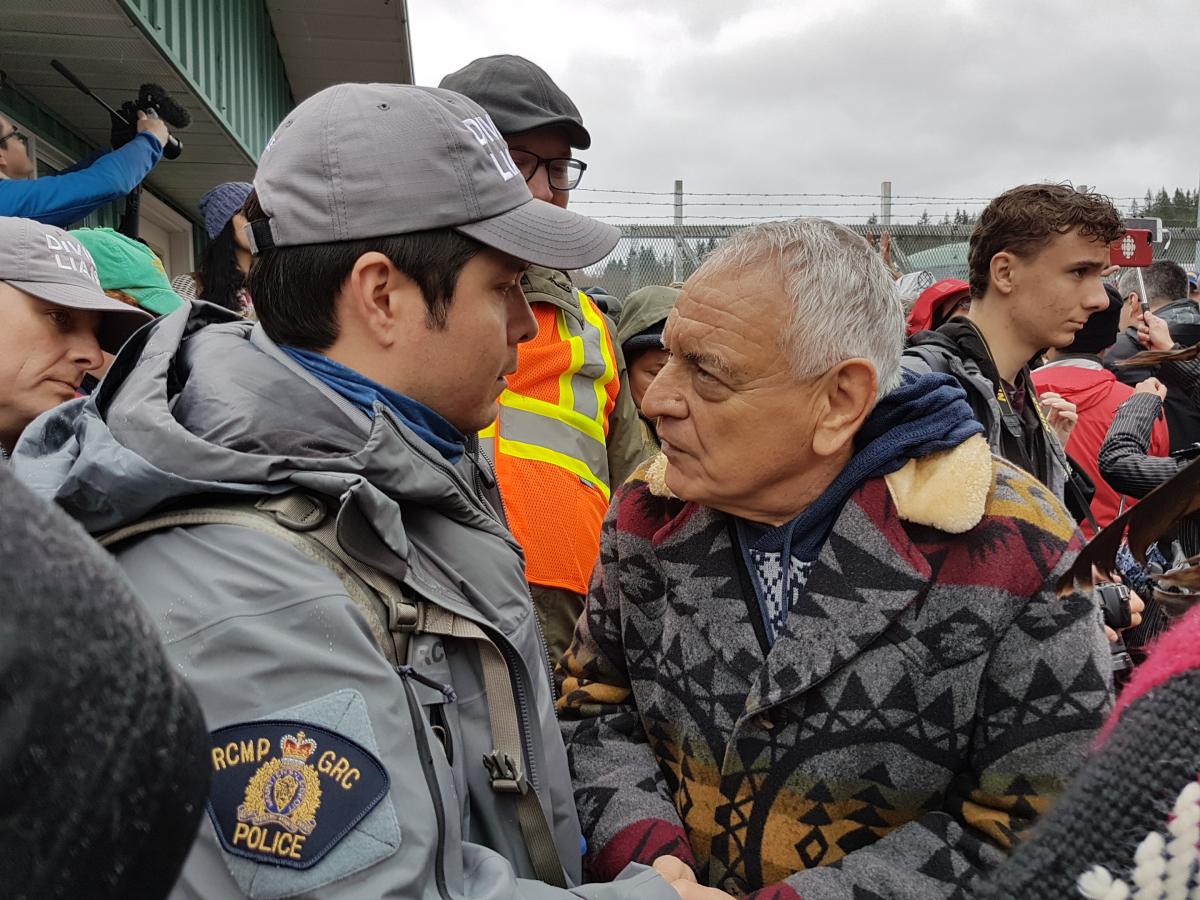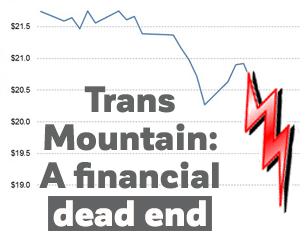
Kinder Morgan has set a May 31 deadline to get political certainty. What can the federal government do to achieve this? And will it alleviate the host of legal, financial, reputational and practical risks facing the project?
Last week, Kinder Morgan sent the clearest signal yet that it would walk away from its Trans Mountain pipeline expansion project, citing the political risk arising from BC’s intention to study and regulate the transportation of diluted bitumen through the province.
Kinder Morgan Canada (KML) had previously announced a 40% decrease in its capital expenditure budget and stated to its investors that it would hold off on major construction spending until it had more certainty on permitting and the ongoing legal challenges, so the announcement to suspend non-essential spending was not a surprise.
What was new from the announcement was Kinder Morgan’s May 31 deadline to reach agreement with “stakeholders” on measures to achieve certainty for the project to proceed, which put pressure on Prime Minister Trudeau to take some concrete action.
This prompted an emergency federal Cabinet meeting, and caused Prime Minister Trudeau to interrupt an international trip to meet with BC and Alberta Premiers John Horgan and Rachel Notley.
The outcome of that meeting was the possibility that the federal government would use public dollars to reduce financial risk for the Texas-based company, by transferring that risk to the Canadian taxpayers. Meanwhile, BC will stay the course on its diluted bitumen study and proceed with a reference case to the BC courts to confirm that it has jurisdiction. Not exactly a resolution of political risk.
Kinder Morgan CEO Steven Kean stated in KMI’s quarterly investor call about TMX that:
It’s become clear this particular investment may be untenable for a private party to undertake. The events of the last 10 days have confirmed those views.
A KMI press release similarly stated:
“Rather than achieving greater clarity, the Project is now facing unquantifiable risk."
While the federal government does have tools to assert its jurisdiction against the wishes of British Columbia, using those tools may not secure the certainty Kinder Morgan wants.
National affairs columnist Chantal Hebert put it this way:
For if Kinder Morgan is expecting a sea change in the adversarial climate attending its implementation of the Trans Mountain plan between now and the end of May, it might as well be reaching for the moon.
It is not that the federal government does not have legal and constitutional tools in its box to try to ensure the project goes through but that it has none that is guaranteed to achieve peace anytime soon on the pipeline front. Indeed, using those tools could make matters worse.
Regarding financial backing, Hebert also wrote:
But keeping the pipeline expansion alive with an injection of federal funds will neither detract its opponents from fighting it every step of the way nor eliminate the threat of more litigation.
On the contrary, Trudeau’s promise of new federal legislation to re-affirm Ottawa’s constitutional authority on the file is likely to open yet another front in the legal battle or even to expand the existing one. In Canada, no law — federal or provincial — is immune to a court challenge.
First Nations opposition growing, while support has diminished
Nothing from the Trudeau-Notley-Horgan meeting addresses the other significant risks facing the pipeline. As some commenters observed, including the National Chief of the Assembly of First Nations (AFN), the jurisdictional elephant in the room was highlighted by the absence of any First Nation perspective in the meeting. The meeting only served to reinforce one of the potentially fatal flaws facing the government approvals – treating First Nations as stakeholders rather than rights-holders (and constitutionally protected rights at that).
Indeed, it appears as if First Nations support for the project is waning. Pipeline supporters have been repeating that 43 First Nations have signed Mutual Benefit Agreements (MBAs). What they don’t say is that this represents less than 1/3 of the First Nations on the pipeline and tanker route. Or that one year ago, the number of First Nations with MBAs was 51.
But the numbers of supporters is a bit of a red herring when it comes to Aboriginal rights. A linear project like a pipeline needs to be 100% complete to be 1% effective. And specific First Nations’ concerns around drinking water, fishing rights and oil spills are not eliminated by other nations signing deals.
In short, even if just one First Nation’s constitutionally-protected rights were violated, then the legal risk to the project remains, regardless of agreements the company has signed with other nations.
Legal risk: 16 outstanding legal challenges to federal and BC approvals, and a reference case
Sixteen legal challenges to the federal and provincial approvals remain outstanding, with no guarantee that a decision will come before the May 31 deadline. In fact, when asked about the 14 consolidated cases at the Federal Court of Appeal, Kinder Morgan CEO Steven Kean stated (at 21:30):
[I]f that appeal has an adverse outcome, meaning that the order in council is overturned on appeal then that means the whole underlying approval and basis for this project has gone away.
…
It would also be very concerning if, for example, that order comes back and it sends us back to do more work, right, so that if the order in council is largely affirmed, but then there are one two three things that need to go have further record developed, additional time spent, additional conditions perhaps imposed and then those go up on appeal too, that's just I think that's just too much to bear given the point where we are. So it is a separate thing that we have to watch for and see a satisfactory result on, on the judicial review. [emphasis added]
In other words, regardless of the political uncertainty and Kinder Morgan’s May 31 deadline, a win on any of the legal issues before the Federal Court of Appeal (FCA), and perhaps even a future appeal of the FCA’s decision to the Supreme Court of Canada, would be too much to bear for Kinder Morgan. Based on the timing in the Enbridge Northern Gateway decision, our best guess for a decision from the FCA is sometime in June.
Further, there are two other cases before the BC Supreme Court challenging BC’s approval of the project. Success by the applicants in these cases would spell major trouble for any construction in BC, including obtaining the 600+ provincial permits that Kinder Morgan has not yet applied for.
And finally, BC’s reference case to determine the extent of provincial jurisdiction remains on the table following the Trudeau-Horgan-Notley meeting. This means that any further action from BC will have pre-approval for constitutional compliance by the courts before being enacted. This will not decrease political risk or uncertainty.

Kwekwecnewtxw Mobilization March 2018 Photo: Eugene Kung
Reputational risk: resistance deepens on the ground
As stated in a recent risk assessment by the Indigenous Network on Economies and Trade:
The surprise announcement from Kinder Morgan came on that same weekend that the company refrained from having high-profile Indigenous leaders arrested that joined in a blockade at its facility in Burnaby. This indicates the company recognizes the risks posed from rejection of the project by Indigenous Peoples. The failure of KML to yet again disclose those risks should be deeply disconcerting to investors and lenders.
With nearly 200 people arrested in the last month, and over 24,000 people pledging to do “whatever it takes to stop the Kinder Morgan pipeline,” this resistance is likely to grow – especially if Prime Minister Trudeau takes steps to force the pipeline through without consent of local communities.
This means that if the pipeline does get built, it will be a long, ugly struggle. The question is whether it will be ‘too much to bear’ for Kinder Morgan and Justin Trudeau.

Kwekwecnewtxw Mobilization March 2018 Photo: Eugene Kung
Trans Mountain and a history of delay
When the Trans Mountain application was first filed with the National Energy Board (NEB) in 2013, Kinder Morgan stated that the project would be complete by the end of 2017.
The NEB process was supposed to be 15 months, but a series of delays almost doubled that time.
The first delay happened because Kinder Morgan paused the process to explore the possibility of drilling through Burnaby Mountain. That resulted in massive protests and the arrests of over 100 people, including professors, grandmothers, teachers, youth and a grand chief.
The second delay was due to the NEB appointing Kinder Morgan’s economic expert Stephen Kelly to the board. While this was not Kinder Morgan’s fault, it was seen as a symptom of the “regulatory capture” that has eroded the public’s trust in regulators like the NEB. This was a problem that Justin Trudeau recognized in his election campaign, and the government is now replacing the NEB while maintaining that its review of Kinder Morgan was thorough.
Kinder Morgan also responsible for delay
Kinder Morgan has never built an oil pipeline in Canada, and the recent focus on political uncertainty has conveniently obscured its own role in the current delays.
Mandatory NEB detailed route hearings have been extended due to Kinder Morgan’s failure to publish notices on schedule for what it should have known would be contested hearings. Those hearings were removed from Kinder Morgan’s May 2017 project schedule, even though the company knew that the route would be contested, in order to maintain the illusion of a December 2019 in-service date just before Kinder Morgan Canada launched its initial public offering.

Graphic: The Dogwood Initiative
Economic uncertainty
Canadians are now faced with the prospect of tax dollars being used to bail out this project, and that should be concerning because the business case is eroding quickly, if it has not collapsed altogether.
Remember that when Kinder Morgan proposed the project in 2013, the price of oil was over $100 a barrel, there was no Paris Agreement, and reconciliation with Indigenous peoples was not a political priority.
Kinder Morgan tried, and failed, to secure a joint venture partner on the project, approaching infrastructure giants such as ArcLight Capital Partners, Brookfield Asset Management and IFM Investment. Three of Canada’s largest pension plans were also reportedly approached but didn’t take Kinder Morgan’s bait.
Indeed, while Natural Resources Minister Jim Carr continues to repeat the myth that tidewater access will fetch a higher price for Alberta oil, the reality is that the global demand for diluted bitumen is weak. Plus, new developments in oil supertanker transportation, which Kinder Morgan’s shippers would have to compete with, have further weakened the economics of the project.
Will throwing money at an uneconomic project increase Kinder Morgan’s tolerance for political risk? That remains to be seen.
At the end of the day, Canadians should be asking themselves: if this project can only work if it is built immediately – and any delay would cause it to be uneconomic – then how long before the “national interest” becomes a national liability?
Top Photo: The Prime Minister's Office Flickr